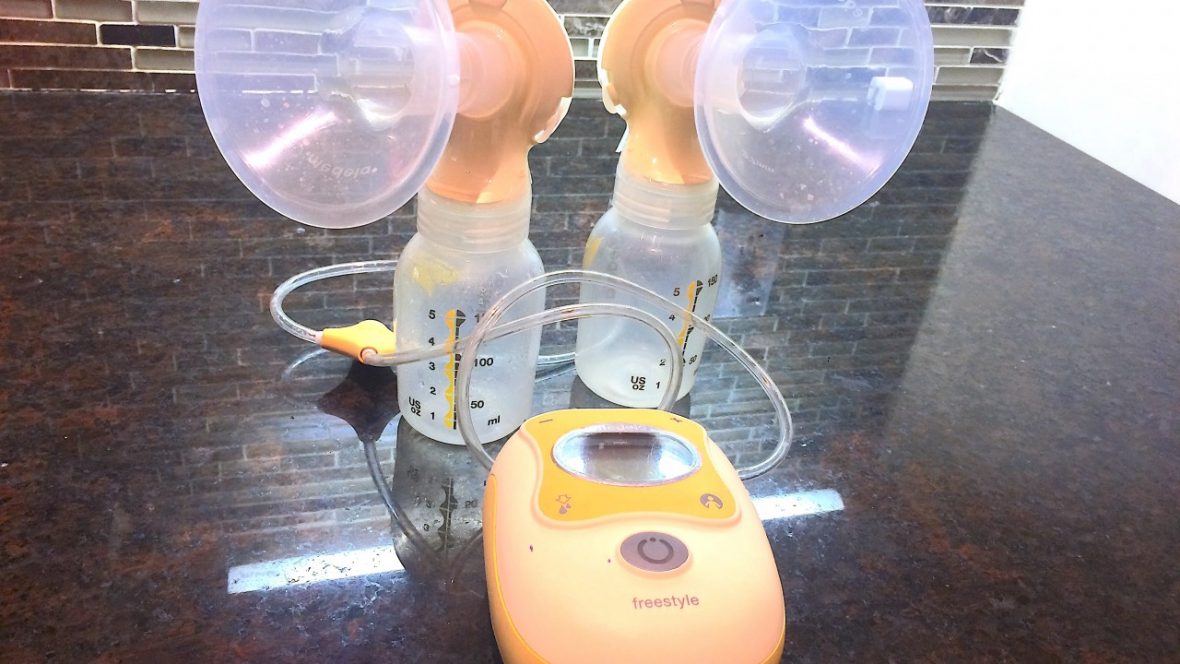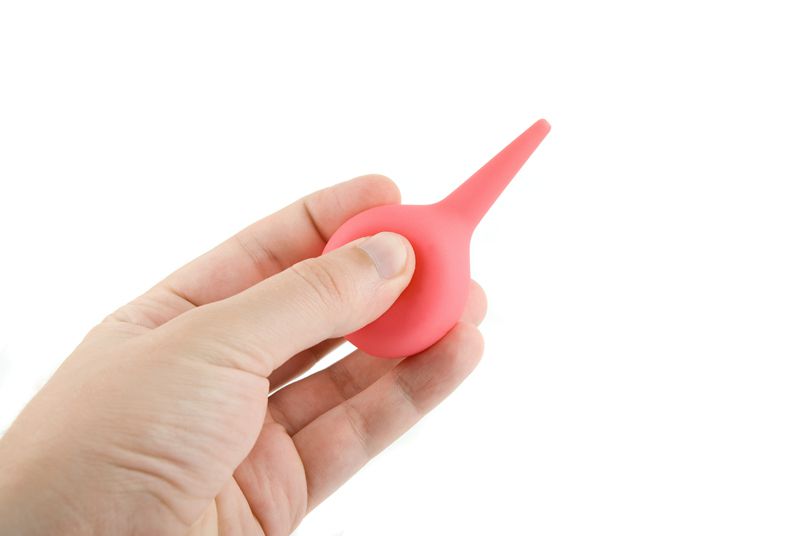When most new mums bring their freshly-minted babies home from the hospital, they are still in that wonderful stage where all they do is sleep. Then…whoa. They wake up. And some babies wake up with a vengeance, discovering their lungs and their likes and dislikes quickly. Others fuss.
Fussing is hard to read: you don’t know exactly what is bother baby, and it quickly becomes frustrating, especially to women whose nether regions still feel like they’re on fire and who need sleep, a shower and to have fluids stop dripping out of various body parts.
I remember with my daughter, my first child, laying her down on the couch and just running away to the bathroom to sob for five minutes (she was safely swaddled, no chance of rolling off–she was only six days old) because I couldn’t get her to stop fussing.
Post-partum depression, nerves, hormones, whatever, it sucked. Now, however, I’m an old hand. Four kids have taught me a lot, and what I didn’t learn myself, I learned from other, even more experienced and insightful moms. Read on. These aren’t cure-alls, but they all help somewhat…you may have to use them all at various times, or invent your own techniques, because all kids are different, just like all moms.
Temper tantrums are not exclusively the province of small children; adults have them all the time. Sometimes throwing yourself on the ground and kicking and screaming is highly therapeutic. However, it is something that should be kept to a minimum, because it’s embarrassing in public, and it’s disheartening at home. Here is how to handle a temper tantrum.
1. Prevent the Tantrum. The absolute best way to handle a temper tantrum? Not letting it happen in the first place. You know your child pretty well, you know his or her “triggers”. Often, tantrums happen when a child is over-tired, over-stimulated, hungry, bored or confused/scared. When possible, try not to let a kid get stressed out like that, especially when you’re in public. Going on a trip? Plan ahead–schedule traveling when the child is sleeping if that’s an option for a road trip, but for flying try to stick to the morning, when they’re not fatigued. Limit their exposure to new stuff and other stressful situations as much as you can; introduce new people, places and things in small bite-sized chunks, to minimize overkill.
2. Short-Circuit the Tantrum. Although kids love going out and spending time with you, after a while they get grumpy, bored and tired. If you’re planning a shopping trip or know you’ll be out for a long time, leave them home when you can. If not, bring some small diversions: load kid-friendly apps onto your phone or iPad, bring coloring supplies, etc. You see Junior getting grouchy and restless? Give him something to do. Or, start talking, playing or singing with him directly, making the experience more fun. Distract them from their boredom, and give them something positive to do rather than grouch.
3. Don’t Fan the Flames. OK, so, little Jane is getting wound up. She’s whiny, restless, irritable. What do you do? Well, it’s more about what NOT to do. Don’t encourage it by paying attention to (and therefore reinforcing) the bad behavior. Don’t give in an gripe back, or get impatient with them, or speak angrily–it makes everything worse. It turns into a vicious cycle that no one benefits from. Again, try distracting and redirecting. Be lighthearted and try to ignore the behavior. Offer hugs. Look your child in the eye and tell them, calmly and lovingly, that they need to calm down, or there will be consequences, like loss of privilege or something. Don’t threaten (“Wait till we get home!!”) or be negative (“I can’t believe you’re being so bad!”). Say something like, “Sweetie, I know you’re upset/angry/frustrated right now. But crying and yelling won’t make it better. Stop kicking the shopping cart/gnawing on the chair/throwing rocks right now, or you’ll lose the Xbox.”
4. Get YOURSELF Under Control. Now you’ve got a full-blown wail and kick session going on? Or crying and yelling? Perhaps he or she has started hitting things? Feels like the eyes of the world are on you, and it sucks. Try to take a deep breath and count backward from ten. Close your eyes for a moment and attempt to get yourself under control, because you accomplish nothing by getting your OWN tantrum going. Remember: you’re not a failure because your kid is a little out of control…ok, maybe a lot out of control. You’re not a bad parent. You don’t have a bad child. You just have a situation, and it will end eventually. Just get through it.
5. Change the Venue. Sometimes, when it’s gotten bad and you’re running out of option, the only thing to do is to remove the kid from the situation. Yeah, it seems like you’re giving up and giving in, but a change of scenery will often disrupt the tantrum. Are you in the grocery store in the middle of the line? Ignore the reproachful eyes of snotty and judgmental people (there are probably a lot more sympathetic moms and dads than judgmental jerks, though it may not feel like it at the time), ask the clerk to let you put your cart aside for when you come back (often they know exactly what you’re dealing with), and take your child out of the place.
6. Let it Run its Course. There will be times when nothing, absolutely nothing, that you can or want to do will change the tantrum. If you’ve removed the child from the situation, try to find a place to let them go to town. A grassy area. The backseat of the car. Somewhere they can have a meltdown and not hurt themselves or others. If you’re at home, make sure there’s nothing breakable or valuable nearby, and let them shriek it out in their room. Close the door and walk away (stay within earshot), indicating you don’t approve. Trying to hold them down, yelling at them, or physically punishing them only makes things worse. Usually a tantrum only lasts a few minutes, although it feels like an eternity to you and the child. And if they don’t have an audience, it often ends quickly.
7. Be Irreverent. I confess, I have been lucky with my kids, I have only had a few tantrums to report. My strategy? I’m silly. When a kid starts being a grouchy butt, make them laugh if you can. Are they on the floor kicking and screaming? If you can (I only suggest this at home), get down on the ground with them and do it, too! 99% of the time the kid will stop what they’re doing to watch you in bewilderment, which will quickly turn into amazement and then hilarity. For real, ladies. It works. AND it feels good to let loose a little, too. Or, an alternative technique (for home) is to start doing something else silly, such as tossing stuffed animals or pillows their way. Start singing a funny song, or do a goofy dance (I recommend the Funky Chicken, they can’t resist it). Stop taking it so seriously. Your anger and negativity is like gasoline on a fire when it comes to a tantrum: it makes it all worse for both of you. Vicious cycle, remember.
8. …Bribery. I confess, some tantrums have been short-circuited by a well-placed, small-yet-effective bribe. I’m not talking about buying them a go-kart or a a pony or a new game console. Maybe a tiny toy, or a little piece of candy. Don’t do this once they’ve progressed into a full tantrum, because that validates their bad behavior, saying they’ll get a reward for being bad. But it can circumvent the progression from grouchiness to tantrum…just don’t do it all the time, or you’re setting another negative pattern.
Don’t beat yourself up if your kid flies off the handle every now and then, especially if you have a special needs child or you have multiple kids stressing you and each other out. Things happen. Relax, breathe deeply, and don’t take everything so seriously. The tantrum, like all things, will pass.
Most parents must wage the “great battle of the binky” eventually, although many of them dread the prospect. Pacifier use is something that is a lot like politics: everyone has an opinion, but not everyone shares it. Some parents refuse to give their baby a pacifier. Others offer the pacifier to their baby as soon as they can. Yet others, in despair of ever sleeping again, try to get their child to use a pacifier, and it does not work for some reason, because the baby won’t take it. For those parents whose children grabbed onto their pacy and soon found it to be as indispensable as their diaper or their bottle, there is hope. That battle can be won—it just takes some patience, ingenuity and, sometimes, some subterfuge. So how do I wean my toddler off of the pacifier?
Pacifiers aren’t “evil,” despite what the anti-binky purists say. Most kids will leave their pacifier behind on their own after a while, and those kids that use them don’t have long-term effects from having used them for a long time. Sure, there are some studies which link slightly delayed speech or self-soothing habits to pacifier use, but it isn’t as if the child were bungee jumping or swimming with sharks. However, when your child has pitched a major tantrum in a very public place because they left their binky at home, you will want to end that dependency, as much for your sanity as theirs. Here are some tactics that have had success. Remember that every child is different, so there is no “magic bullet” to this pesky problem.
1. Go cold turkey. This option requires some serious mental and emotional fortitude on the parent’s part, because it can be as traumatic to them as it is to the child. This tactic works best on children with a milder temperament who aren’t as fixated on their pacifier. Some parents “lose” it, others simply take it away and deal with the consequences. Be prepared for some hard-core crying, but since children of this age group have short attention spans and get past things quickly, it might be a viable option for you.
2. Build up to it gradually. This one takes some strategy, but it is accepted as the “best” method by childhood development and psychologists. Start out by pointing out “big kids” to your child while at the playground or the store that aren’t using a pacifier. Set a date in the future for giving up the binky: make a calendar, check off the days with star stickers, and on the big day have them throw it away, with or without a nice reward (some parents think that’s bribery…but it does work sometimes…). Or, invest in a book like The Binky Ba-Ba Fairy, by Heather Knickerbocker-Silva, where a fairy takes children’s pacifiers and give them to younger children in need, and let them feel good about themselves for helping others and being a big boy or girl. None of these methods will stop the child from having some residual pining for the pacifier at certain times, but these esteem-building experiences give something to the child instead of simply taking them away.
3. Interference methods. These are somewhat controversial, but none of them is abusive in any way. These are “old-timey” methods that our moms and grandma’s used before…and they do work. These methods work by interfering in the child’s ability to enjoy their binky. Some moms swear by dipping the pacifier into a cup of strong-brewed coffee or in lemon juice, giving it a bad taste. Some moms will cut a little nick into the “nipple” portion, which changes the pacifier’s smooth texture and makes it harder to suck on.
4. Let the child decide. As stated before, every child is different, and there is no 100% foolproof method of getting a child to stop sucking that pacifier. Sometimes, when you’ve tried everything and it hasn’t worked, you find out that it’s best to allow the child to decide when and where to let the binky go. Many children will wake up one day and mysteriously have no interest in it anymore. Others will go to school, see other kids without pacifiers, and conclude that they don’t need one, either. Regardless of how or when, they will eventually let it go.
We all know that fish are a great source of Omega 3’s and fatty acids, but consuming fish during pregnancy isn’t always safe. Research has indicated that they are also a source of harmful toxins, such as pesticides and heavy metals such as mercury. These harmful chemicals tend to accumulate “higher up the food chain”, meaning that the bigger the fish the more contaminated it is likely to be.
Because of potential toxicity, fish consumption should be limited especially during pregnancy, lactation and in young children. Health Canada advises that all Canadians should limit their consumption of fresh and frozen tuna, shark, swordfish, escolar, marlin and orange roughy due to their mercury levels. Heavy metals such as mercury have a negative impact on the development of the fetal nervous system as it tends to accumulate in the brain. This can lead to health problems such as decrease in I.Q., delays in walking and talking, lack of coordination, blindness and seizures.
Omega 3 fatty acids, more specifically – EPA and DHA – are very important in healthy fetal development. Research indicates that they prevent premature births, are involved in healthy development of vision and the nervous system and increase intelligence. Essential fatty acids also have potential benefits for the mom. In studies they have shown to be important nutrients in the treatment of depression.
Non-fish sources of omega 3 fatty acids include walnuts and ground flaxseeds. However, these food sources do not contain enough of the essential fatty acids and you should not rely on these sources alone for the omega 3 health benefits. Taking a supplement of fish oil during pregnancy is the best option available to ensure that you and your baby’s health are protected and nurtured during pregnancy and beyond. Fish oil provides the benefits of omega-3 fatty acids without the risk of toxicity. However, beware of the type of fish oil you choose to take. You should make sure that the company that produces the fish oil uses strict guidelines that ensure the fish oil is molecularly distilled to remove the heavy metals, pesticides and other chemicals that are commonly found in fish.
Dr. Agnieszka Matusik, ND is a Naturopathic Physician practicing family medicine in Kerrisdale and Kitsilano communities of Vancouver. For more information contact her at drmatusik@gmail.com.
Listen ladies .. (I know that this may shock you) but PMS and PSD are NOT NORMAL ways for the female human body to behave. It is tolerated and accepted but it is not natural. It is a sign that the body is in dire need of a spring clean and some TLC.
 Eeny-meeny miney mo…which baby names are “best of show”? The names that people choose for their new bundles of joy are based on so many different factors. One of the top reasons that people give their child a particular name is due to the meaning of the name. From connotations like, “full of wisdom” and “strong, firm and impetuous” to meanings like “hollow” and “uncertain”, the name that you give your child carries some kind of significance in one light or another. Some parents feel like if they bestow their baby a name that transmits the implication that their child is “smart” or a “king”, that child will turn out to be what their name signifies and steer away from the names with negative connotations.
Eeny-meeny miney mo…which baby names are “best of show”? The names that people choose for their new bundles of joy are based on so many different factors. One of the top reasons that people give their child a particular name is due to the meaning of the name. From connotations like, “full of wisdom” and “strong, firm and impetuous” to meanings like “hollow” and “uncertain”, the name that you give your child carries some kind of significance in one light or another. Some parents feel like if they bestow their baby a name that transmits the implication that their child is “smart” or a “king”, that child will turn out to be what their name signifies and steer away from the names with negative connotations.
Some say that children can be the best birth control. Combine a long-term marriage and some kids and most couples hit that impact point when they are wondering exactly what happened to their sex life. Studies show, hands down, that a great sex life improves a relationship – and lack thereof can undermine it. Believe it or not, it really doesn’t take much to get your sex life back on track. Here are a few ideas to get you going in the right direction:









